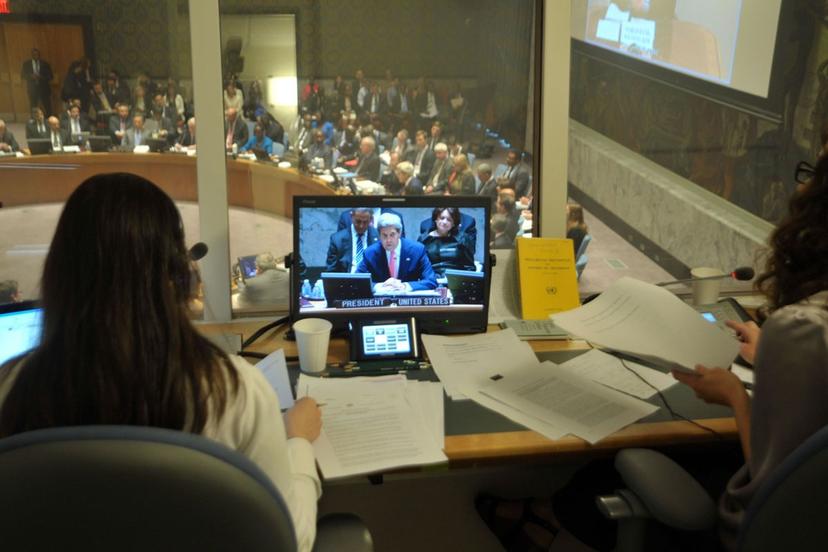Foreign Languages and Studies

Structure
We encounter foreign language and culture in many ways, so several specialized occupations have developed to teach foreign languages, solve communication problems, and overcome cultural barriers.
Foreign languages are taught at all levels of education, even in preschools. There are no good estimates of the total number of foreign language teachers, but the largest association of these teachers in the United States, the American Council on the Teaching of Foreign Languages, has more than 12,500 members. The Bureau of Labor Statistics estimated there were 31,900 postsecondary teachers of foreign language and literature in 2018. Some college faculty members do research in linguistics, the study of language. For example, they may investigate how languages have evolved, how words change their meaning, or how grammar functions. Language instructors also work for the armed forces and at language schools.
Simultaneous interpreters translate the spoken word with a lag of only a few seconds, speaking a translation without requiring the foreign-language speaker to pause. Because the work requires great concentration, simultaneous interpreters often work in teams of two, relieving each other after 20 or 30 minutes of work.
Consecutive interpreters require the speaker to pause, and then they interpret the speaker's previous wording. They may take notes, perhaps in shorthand, on what the speaker says. Both kinds of interpreters attempt to convey the speaker's tone and not just the content of what the speaker says.
Medical interpreters work in health-care settings to facilitate communication between patients and doctors, nurses, or other medical workers. These interpreters need to be knowledgeable about medical terminology, plus the guidelines for ethics and privacy in health care. They need to know both the technical terms and the more common terms that are used in both languages.
Legal interpreters work in courts, law offices, and prisons. They facilitate communication in a legal setting such as a trial, hearing, arraignment, or deposition. They need to understand legal terminology, the procedures of the justice system, and the ethics of legal representation. Because courtroom testimony requires "the whole truth," the interpreter must be extremely careful not to omit any wording. Sensitivity to cultural contexts can be very important.
Guide interpreters, sometimes called escort interpreters, accompany travelers who do not speak the language of the places they are visiting. To facilitate communication and avoid misunderstandings between the travelers and the locals, knowledge of the foreign culture as well as the language is valuable. The work often involves a lot of travel. Guide interpreters frequently are expected to deal with many issues for travelers such as confirming bookings, seeing that luggage is routed appropriately, haggling with shopkeepers, and finding recreational activities.
Conference interpreters overcome language barriers at diplomatic and business meetings. For the sake of efficiency, they often do simultaneous interpretation, as is the practice at the United Nations. In some business settings, technical knowledge of the industry is necessary.
Translators, like journalists, work with the written word and often have to meet a deadline. They may specialize in an industry with which they are familiar, such as law, high tech, or health care. Some have a background in literary studies or creative writing and translate novels, poems, and other literary works, sometimes in collaboration with the original author. Computerized aids can speed up the translation process by rendering wording into another language in rough form, which the translator then checks and cleans up.
Localization specialists do more than just render wording in a different language; they make or suggest other changes that will make the material appear to have originated in the country where it will be sold. For example, for a cartoon they may suggest using a musical soundtrack with greater appeal for local children. Even within a single language with global variations, localization services may be needed to adapt the spellings or vocabulary. These workers need a thorough knowledge of the culture for which they are making the adaptation.
There are also trilingual interpreters, who specialize in interpreting communication between an English speaker, a foreign language speaker, and an American Sign Language user. This work requires the ability to understood all three languages and interpret what is being said without losing the meaning of the message.
Other experts in foreign culture do work that goes beyond just language. Some work as consultants to help businesses understand how to market or conduct operations within a foreign culture. Some help diplomats, Peace Corps workers, the military, and other representatives of the U.S. government better function in foreign settings. Others help intelligence services by explaining the implications of documents and other communications obtained from foreigner, either abroad or here in the U.S. In 2018, approximately 12,600 people worked as area, ethnic, and cultural studies teachers at the postsecondary level. This number includes those teaching some area studies other than foreign cultures, such as women's studies.
Language specialists also work for the federal government. This job category includes interpreters, translators, intelligence workers, writers and editors, workers in foreign settings (such as Peace Corps trainers), and teachers at all levels.
